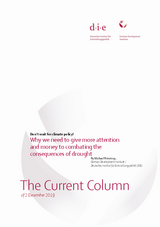The Current Column
Don’t wait for climate policy!
Why we need to give more attention and money to combating the consequences of drought
Brüntrup, MichaelThe Current Column (2019)
Bonn: German Development Institute / Deutsches Institut für Entwicklungspolitik (DIE), (The Current Column of 2 December 2019)
Bonn, 2 December 2019. Droughts are one of the starkest consequences of climate change and are becoming increasingly frequent, prolonged and intense. The extent of the short-, medium- and long-term damage they cause depends on the degree of vulnerability of the ecosystems, societies and economies affected. Those that are able to absorb the effects of drought and recover are referred to as being climate-resilient. The last two years have taught us a painful lesson in Germany about the major losses and, in some cases, irreparable damage that droughts, combined with high temperatures, can cause to the agriculture and forestry sectors, and to natural forests themselves. Rivers fell to such low levels that shipping was disrupted and issues arose with cooling power plants and supplying industrial facilities with process water. If years like these become more frequent, then we can expect serious consequences for the environment and the economy, consequences which cannot be easily offset, even in a nation as wealthy as Germany. The consequences in developing countries are far more dramatic, with droughts threatening not only the economy, but also food supplies, income sources, health, drinking water supplies and, as a result, people’s livelihoods. According to a report by the Global Water Institute, in Africa alone, between 24 and 700 million people could be displaced due to a lack of water, even if some scientists view these figures with scepticism. And the environment could also suffer lasting damage if the climate changes and the natural resilience of ecosystems is overstrained. All of this points to a need to mitigate the devastating consequences of drought, in Germany and elsewhere. This involves both (the enormous task of) reducing greenhouse gas emissions and combating the consequences of climate change, which can no longer be reversed. If we were only dealing with the damage caused by climate change, then it would be relatively simple to measure and put figures on it and to resolve the issue of blame. Historically speaking, the primary responsibility for greenhouse gas emissions rests with industrialised nations and, more recently, emerging economies. However, climate change is not the only cause of drought. Droughts also occur independently of global warming and are intensified in terms of their duration and consequences by human activity, such as non-sustainable farming, which leads to large-scale deterioration in vegetation and soil quality. Modern technology allows us to destroy increasingly large, otherwise robust ecosystems and, by extension, their drought resilience. This issue is also highlighted by the forthcoming Word Soil Day on 5 December. Drought and drought damage are thus a highly complex result of natural fluctuations, local man-made environmental damage and climate change. Clearly apportioning blame in this case is virtually impossible and a permanent debate on loss and damage is inevitable. The situation would be described in Roman jurisprudence as actore non probante reus absolviture: “When the plaintiff does not prove his case the defendant is acquitted”. However, this cannot be the end of the debate. Damage at local and regional level and its consequences are too severe for us to sit back and wait until new findings are published. Drought can ruin decades of development efforts and this is also something we should not be willing to accept. Regardless of the UN climate negotiations, we must campaign proactively to promote strategies that enhance drought resilience. One example would be an international drought fund that supports developing countries with increasing their drought resilience. It would need to acknowledge the efforts of individual governments and good governance, support local initiatives wherever possible and promote other Sustainable Development Goals (SDGs). After all, many measures relating to drought and drought resilience interact directly with other SDGs addressing food security, sustainable water use, poverty reduction and life on land. Examples include the promotion of robust crop varieties, mixed forests, water storage in soils and dams, weather insurance, social security systems, warehousing and income diversification. The fund could be financed from development and disaster funding, insurance premiums and existing climate funding. It should not finance the measures itself, as these are too wide-ranging and expensive, but rather national strategies for promoting and coordinating such measures. The fund could be administered by the UN Convention to Combat Desertification (UNCCD), which has an international mandate to promote drought resilience and counteract soil degradation and desertification. However, it is a reality of drought resilience that this fund will be unable to replace emergency assistance in particularly severe cases, which will still occur despite our best efforts. The motto is thus in dubio pro res publica or, In the sense of the Institute’s new mission statement, "if in doubt, promote the global common good."


